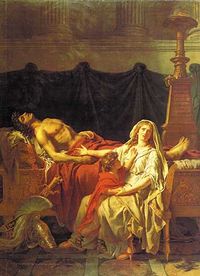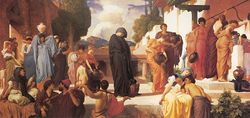Andromache

In Greek mythology, Andromache (pronounced /ænˈdrɒməkiː/; Ancient Greek: Ἀνδρομάχη) was the wife of Hector and daughter of Eetion, and sister to Podes. She was born and raised in the city of Cilician Thebe, over which her father ruled. The name means "battle of a man", from ἀνδρός (andros) "man" and μάχη (machē) "battle".[1]
During the Trojan War, Hector was killed by Achilles, and their son Astyanax was thrown from the city walls by the Greek Herald Talthybius. Neoptolemus took Andromache as a concubine and Hector's brother, Helenus, as a slave. By Neoptolemus, she was the mother of Molossus, and according to Pausanias,[2] of Pielus and Pergamus. When Neoptolemus died, Andromache married Helenus and became Queen of Epirus. Pausanias also implies that Helenus' son, Cestrinus, was by Andromache. Andromache eventually went to live with Pergamus in Pergamum, where she died of old age.
Contents |
Classical treatment

- Homer. Iliad VI, 390–470: XXII 484-575
- Apollodorus. Bibliotheke III, xii, 6.
- Apollodorus. Epitome V, 23; VI, 12.
- Euripides. Andromache.
- Euripides. The Trojan Women.
- Virgil. Aeneid III, 294–355.
- Ovid. Ars Amatoria III, 777–778.
Homer's rendering of Andromache portrays her as a perfect wife, giving Hector sound advice regarding the defense of Troy which he disregards in favor of meeting the Greeks in the field of battle[3]. When she hears of Hector's death, she is embroidering flowers into a purple cloak, demonstrating her distinction from Helen, who is portrayed embroidering a battle scene earlier in the epic[4].
In Euripides' The Trojan Women, Andromache despairs at the murder of her son Astyanax and is then given to Neoptolemus as a concubine. In his Andromache, Euripides dramatizes when she and her child were nearly assassinated by Hermione, the wife of Neoptolemus' and daughter of Helen and Menelaus.
Modern treatment

She is also the subject of a tragedy by French classical playwright Jean Racine (1639–1699), entitled Andromaque, and a minor character in Shakespeare's Troilus and Cressida. Andromache is the subject of a 1932 opera by German composer Herbert Windt. She was portrayed by Vanessa Redgrave in the 1971 film version of Euripides' The Trojan Women, and by Saffron Burrows in the 2004 film Troy. She also appears as a character in David Gemmell's Troy series. Marion Zimmer Bradley's "The Firebrand" makes her an Amazon princess--Homer does name the Amazons among the Trojan allies, interpreting her name as 'she fights like a man.'
References
- ↑ Campbell, Mike. "Andromache". Behind the Name. http://www.behindthename.com/name/andromache. Retrieved 2007-11-12.
- ↑ Pausanias. Description of Greece, 1.11.1.
- ↑ Homer, Iliad trans. Lombardo Book VI 455-467
- ↑ Homer, Iliad trans. Lombardo Book XXII 484-575
External links
![]() Chisholm, Hugh, ed (1911). "Andromache". Encyclopædia Britannica (Eleventh ed.). Cambridge University Press.
Chisholm, Hugh, ed (1911). "Andromache". Encyclopædia Britannica (Eleventh ed.). Cambridge University Press.
|
||||||||